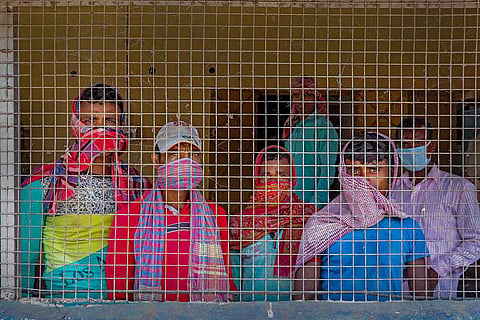

“For the past two months, we have not received our salary. We have not been provided with proper food or ration. We were left to starve and now, they are asking us to resume work,” says a labourer from Jharkhand, who has been working at a site in Ambattur, Chennai.
He continues, “They say they are ready to pay us now, but we are not ready to trust them. We have our children and parents to take care of. We don’t want to be here anymore.”
Thousands of migrant labourers working at construction sites across Tamil Nadu are facing a similar situation — unable to leave home and unwilling to begin work under stressful conditions. As a mark of protest, migrant workers in many places across the state declined to resume work on Monday, demanding the state government to help them return to their home states. This comes just a day after the Tamil Nadu government launched a website stating that those stranded in the state and wish to return home can fill out a requisition form.
Amid the lockdown, workers from companies, including Larsen & Toubro (L&T) and L&W Constructions in Chennai, shouted slogans and gathered together at the construction sites in Porur, Perungalathur and Ambattur areas. According to Tamil Nadu government’s graded relaxation of lockdown norms, that come into effect from May 4, construction activities can resume outside containment areas if the workers are already living on site.
On Saturday, migrant labourers started protesting in Tamil Nadu when they saw that their counterparts in Telangana were being allowed to travel back home in special trains. The special train was arranged after the Ministry of Home Affairs allowed migrant labourers to travel back to their home state. However, a clarification was issued on Sunday that only those people stranded just before the lockdown would be taken to their respective districts. The clarification intensified the protests across Tamil Nadu.
Upset by the clarification, on Sunday, construction workers working for L&W in Chennai’s Ambattur decided to walk back to their home states like Jharkhand, Bihar, West Bengal and Odisha. However, the police, based on a tip-off, reached the spot and prevented them from doing so. “We were sent back to our dorms and the gates of the companies were shut by the police,” the workers told TNM.
They also add that they have not been paid for the six weeks of the lockdown and were not even given ration properly by the company. The workers had to survive on 200 grams of rice distributed to them every day, thus forcing them to eat once a day and skip the other meals.
The migrant workers TNM spoke to say that as soon as things return to normal, they would prefer to search for job opportunities in Bengaluru and Mumbai instead.
The labourers were also stopped from going back home at other sites in Chennai. Around 1,200 people gathered at the Alapakkam L&W camp, demanding the police to allow them to leave. A worker at Alapakkam L&W camp says, “We had initially planned to start walking home. What else can we do? We don’t care if we die while walking home but it is better than staying here. There is no peace here, we are in a lot of difficulties. 1,200 people are living in a space meant for 500 people.”
He further alleges, “The police are not helping us, they are in cahoots with the company. They are making us work for the past so many days. The arrangements for food are not good enough. Trains have started and labourers like us from Bengaluru are able to go home back to Jharkhand, but here they are not letting us go.”
The protesters refused to disperse despite police officers holding talks with them. This left the police officers to order the workers to stay inside the site till 8 pm on Monday until further arrangements are made.
“They told us to stay here till 8 pm and if they can't arrange anything by then, they assured us that they will let us go. We told them so many times that we want to go home, but they are not listening. There is a water problem, food problem and we cannot even step out of the gates,” he shares.
TNM has reached out to Ambattur station inspector and is yet to receive a response.
(With inputs from Anjana Shekar)